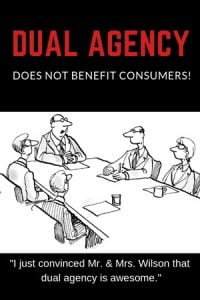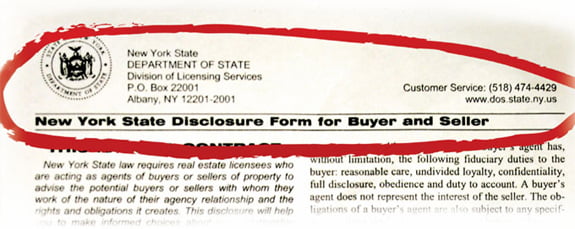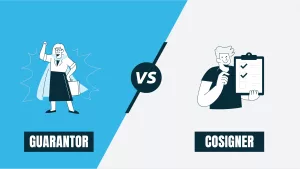2) Seller’s agent & listing broker
3) Dual agency
This choice is tricky for buyers and sellers as the broker must represent both competing parties simultaneously. In reality, this becomes  challenging. An ethical agent will have difficulty sharing information on a need-to-know basis.
challenging. An ethical agent will have difficulty sharing information on a need-to-know basis.
If a Dual Agent knows that a seller needs to sell and is desperate, this broker can’t share this information with the buyer he represents. If the Dual Agent knows a buyer can pay more, he can’t share this information with the seller.
The bottom line is that the broker’s hands are sometimes tied. This behavior makes this dual agent somehow less efficient for both sides. Unethical agents tend to favor a given party in the negotiation, generally the first party who hired them to sell the apartment.
Respecting your fiduciary duties towards both parties is difficult under these conditions. The Dual Agent tends to favor the seller’s interests for many reasons. The seller is his client, and he probably has a personal relationship with him. Also, the seller client will still be there if the buyer flakes.
We recommend buyers remain firm in not agreeing to Dual Agency when purchasing a home. In fact, why would you give up your right to free and undivided representation from a buyer’s broker?
From a monetary point of view, why would you pay double commission to a listing agent who could work for your best interests?
Lastly, why would you give up on returning some of that commission via a buyer commission rebate? Dual agency is like getting paid double for half the work!
4) Advanced Informed Consent to Dual Agency in the real estate NY Disclosure Form
If a seller refuses to accept the Dual Agency, this seller can check both boxes (i) Seller’s Agent and (ii) Advanced Informed Consent Dual Agency.
Agency.
If the seller does that, the seller’s broker will only represent the seller’s interests until the Dual Agency happens. Similarly, if a buyer signs the Dual Agency, the seller has already decided to accept it.
This is sometimes an advantage for the seller in a Full-Service for a 1% listing. Indeed, the seller can save more in commission if the listing Agent can convince the buyer to remain unrepresented.
5) Dual Agent with a Designated Sales Agent in the real estate NY Disclosure Form
This concept is valid for giant brokerage firms (Corcoran, Douglas Elliman, Compass, etc.). The brokerage is a Dual Agent. However, there are separate individual brokers representing buyers and sellers.
This example frequently happens when a separate agent of a given brokerage happens to represent a buyer interested in a unit listed by another seller’s agent of the same firm. In this case, the brokerage knows both sides of the deal and needs to stay neutral.
6) Buyer’s Agent
The buyer’s agent is the most common relationship a home buyer has with a broker. There cannot be any confusion as to whose side the agent  is on. You can also earn two-thirds of your broker’s commission through NestApple. This way, your incentives are aligned with your Agents’.
is on. You can also earn two-thirds of your broker’s commission through NestApple. This way, your incentives are aligned with your Agents’.
You can refuse when the seller’s broker hands you that NY Disclosure Form to sign while checking the box “Dual Agent.” Brokers must present the form to their clients, but you are not required to sign it.
7) What if I have already signed a real estate NY Disclosure Form?
It does not matter. If a broker makes you sign an NY Disclosure Form and check the Dual Agent, you always have the right to get representation by a Buyer’s Agent later.
We remind buyers that the purchase price includes the broker fees and the cost of your representation. The buyer and the seller pay for the broker’s fees. Buyers should not give away the benefit of representation and, potentially, the cashback.
If you agreed to dual agency, a seller’s broker would be kind of stealing from you because you could win some of this broker fee back via a Nestapple cash back rebate.
 This document is an agency disclosure form that brokers and agents must give to real estate buyers and sellers. The questionnaire explains various types of agency fiduciary relationships. It outlines who the real estate agent serves.
This document is an agency disclosure form that brokers and agents must give to real estate buyers and sellers. The questionnaire explains various types of agency fiduciary relationships. It outlines who the real estate agent serves.  highlights a fiduciary duty
highlights a fiduciary duty 

